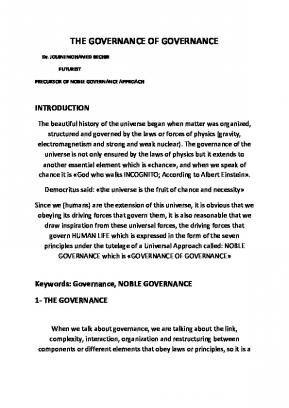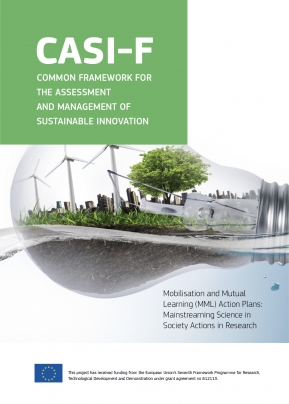
Noble Governance : the Governance of Governance
| Year of publication: | 2024 |
|---|---|
| Authors: | Jouini Mohamed Béchir |
| Categories: | Action Roadmapping, Anticipatory Action Learning, Backcasting, Brainstorming, Causal Layered Analysis, Chaos/Complexity Theory, Citizens Panels, Conferences, Decision Modelling, Design Thinking, Discourse Analysis, Critical Issues Analysis, Environmental Scanning, Essays/Scenario Writing, Expert Panels, Ecosystem Modelling, Focus Groups, Future-oriented MLP, Futures Wheel, Genius Forecasting, Horizon Scanning, Interviews, Literature Review, Logic Charts, Morphological Analysis, POP Mapping, Relevance Trees, Role play/Acting, Scenarios, Science Fictioning, Simulation Gaming, Surveys, SWOT Analysis, TRIZ Inventive Problem Solving, Weak Signals Analysis, Wild Cards Analysis, Workshops, World Café, Benchmarking, Bibliometrics, Forecasting, Impact Assessment, Indicators, Modelling, Quantitative scenarios, Trend Extrapolation, Actors Indifference Analysis, Cross-Impact Analysis, Delphi Surveys, SMIC Scenarios, Stakeholder Analysis/MACTOR |
Its the Theory of ALL
| Tags: | Universal Foresight |
|---|---|
| Date: | 21.06.2024 |

The Future of Forest-based Bioeconomy Areas
| Year of publication: | 2020 |
|---|---|
| Authors: | Rafael Popper, Nina Rilla, Klaus Niemelä, Juha Oksanen, Matthias Deschryvere, Matti Virkkunen, Torsti Loikkanen |
| Permalink to UFO case: | Click here » |
| Categories: | Workshops, Visioning / Vision building, Value Chain/Network Analysis, Surveys, Stakeholder Analysis/MACTOR, POP Mapping, Literature Review, Interviews, Horizon Scanning, Expert Panels, Environmental Scanning, Critical Issues Analysis, Conferences, Brainstorming, Big Data Analytics, Benchmarking, Action Roadmapping |
This VTT Technology report on 'The Future of Forest-based Bioeconomy Areas: Strategic openings in Uruguay and the World by 2050' is the result of a multistakeholder and multi-disciplinary foresight exercise commissioned by the Government of Uruguay in 2018 and completed in 2019. The overall goal of the project was to contribute to Uruguay's National Development Strategy 2050 through the following specific objectives: (1) To identify key global forest-based bioeconomy areas by 2050; (2) To identify needs and gaps in the prioritised FBA in Uruguay; (3) To develop a shared vision for the forest-based bioeconomy in Uruguay by 2050; and (4) To develop a strategic Action Roadmap to achieve the shared vision for the forest-based bioeconomy in Uruguay by 2050. The most important outcomes of the project include: a shared vision for key foresight-based bioeconomy areas (FBAs), as well as five consolidated Action Roadmaps with 511 concrete short-medium-to-long-term actions related to Forest management (FBA1), Mechanical wood processing (FBA2), Fibre-based biomaterial processing (FBA3), Biorefining (FBA4), and Bioenergy (FBA5). In addition, the report provides more detailed recommendations addressing a wide range of research, education, innovation and institutional needs related to the Top 3 Opportunity Pathways (OPs) of the five FBAs. The methodology of the project involved systematic critical issues analysis (drivers, barriers, threats and opportunities), a multi-stakeholder Delphi-like survey, global value network and business news analysis, visioning workshops and action roadmapping. This report is valuable for government, business, research and civil society actors interested in the state-of-the-art and the future of key forest-based bioeconomy areas in the world. Foresight researchers and practitioners will also find interesting methodological approaches, such as the consolidated action roadmaps. Finally, taking worldview perspective, while the project provided an opportunity for foresight knowledge transfer from Europe to Latin America, both the findings and methodology are equally relevant for other world regions and countries concerned with the future of the forest-based bioeconomy. Permalink of this case in the UF Observatory: https://www.universalforesight.com/ufo/all-cases/11111
| Tags: | foresight, bioeconomy, forest, mechanical wood processing, fibre-based biomaterial processing, biorefining, bioenergy |
|---|---|
| Date: | 01.02.2021 |

CASI-F: Common Framework for the Assessment and Management of Sustainable Innovation
| Year of publication: | 2017 |
|---|---|
| Authors: | Rafael Popper, Guillermo Velasco, Monika Popper |
| Permalink to UFO case: | Click here » |
| Categories: | Workshops, Visioning / Vision building, SWOT Analysis, Stakeholder Analysis/MACTOR, Literature Review, Interviews, Horizon Scanning, Critical Issues Analysis, Conferences, Citizens Panels, Action Roadmapping |
This report is the final version of CASI-F: A Common Framework for Assessment and Management of Sustainable Innovation. The framework was informed by a number of preceding tasks and includes inputs from seminars and workshops with a wide range of societal stakeholders, as well as recommendations and feedback gathered from innovators during the mapping of sustainable innovation (SI) initiatives and piloting of CASI-F implementation. The testimonies of stakeholders are therefore presented within the report, in order to further validate the versatility, usefulness and effectiveness of CASI-F, as perceived by its users. The report presents the core of the CASI-F methodology, consisting of five mutually reinforcing sets of protocols and tools (or steps) that constitute the framework, namely: (Step 1) sustainability relevance and scanning; (Step 2) multi-criteria analysis and assessment; (Step 3) critical issue analysis and assessment; (Step 4) multi-level advice management; and (Step 5) action roadmaps management. Although the report marks the final contractual stop of the CASI-F journey, it also highlights the way forward and the potential for a new sustainability assessment and management framework (CASI-F) to thrive beyond the life of the project.
| Tags: | sustainable innovation, assessment, management, public participation, mutual learning, foresight, societal challenges |
|---|---|
| Date: | 07.05.2020 |
Stakeholder Analysis/MACTOR
The Future of Forest-based Bioeconomy Areas
Rafael Popper, Nina Rilla, Klaus Niemelä, Juha Oksanen, Matthias Deschryvere, Matti Virkkunen, Torsti Loikkanen
2020




